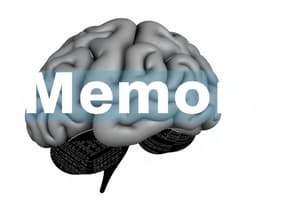Podcast
Questions and Answers
Which type of memory is impaired based on the text provided?
Which type of memory is impaired based on the text provided?
- Memory consolidation
- Non-declarative memory
- Working memory
- Declarative memory (correct)
What does the hippocampus represent according to the text?
What does the hippocampus represent according to the text?
- Person
- Episodes (correct)
- Context
- Schema
Where is storage of recent memory primarily located based on the text?
Where is storage of recent memory primarily located based on the text?
- Hippocampus (correct)
- mPFC
- AT Network
- PM Network
What does mPFC represent according to the text?
What does mPFC represent according to the text?
Which part of the brain encodes long-term memories through synaptic changes?
Which part of the brain encodes long-term memories through synaptic changes?
What does activation in memory correspond to?
What does activation in memory correspond to?
What does the PM Network represent according to the text?
What does the PM Network represent according to the text?
How is long-term memory encoding distinguished from activation in memory based on the text?
How is long-term memory encoding distinguished from activation in memory based on the text?
What is the process in which information is encoded, stored, and retrieved?
What is the process in which information is encoded, stored, and retrieved?
Which type of memory includes habits, skills, and behaviors that are unavailable to the conscious mind?
Which type of memory includes habits, skills, and behaviors that are unavailable to the conscious mind?
What is the term for memory loss that occurs following trauma?
What is the term for memory loss that occurs following trauma?
In declarative memory, what type of information is available to the conscious mind?
In declarative memory, what type of information is available to the conscious mind?
What are the key components of memory according to the text?
What are the key components of memory according to the text?
Which type of memory is characterized by information that guides ongoing behavior?
Which type of memory is characterized by information that guides ongoing behavior?
What is the term for memory loss that occurs before trauma?
What is the term for memory loss that occurs before trauma?
'H.M.' mentioned in the text was concerned about which type of memory issue?
'H.M.' mentioned in the text was concerned about which type of memory issue?
What specific lesion did H.M. have following his operation?
What specific lesion did H.M. have following his operation?
What similarity did R.B., another amnesic patient, share with H.M.?
What similarity did R.B., another amnesic patient, share with H.M.?
What was discovered upon careful analysis of R.B.'s brain after death?
What was discovered upon careful analysis of R.B.'s brain after death?
What memory abilities were retained by the amnesic patients discussed?
What memory abilities were retained by the amnesic patients discussed?
Which part of the brain was bilaterally removed from H.M.?
Which part of the brain was bilaterally removed from H.M.?
What type of amnesia was observed in both H.M. and R.B.?
What type of amnesia was observed in both H.M. and R.B.?
What memory function seemed to be unaffected in both H.M. and R.B.?
What memory function seemed to be unaffected in both H.M. and R.B.?
'Their Memories Are Not Equally Affected' implies that:
'Their Memories Are Not Equally Affected' implies that:
What type of brain activity is associated with rest?
What type of brain activity is associated with rest?
Which area of the brain is fine-tuned according to the text?
Which area of the brain is fine-tuned according to the text?
What type of learning rate is required for accurately estimating the probability of an event?
What type of learning rate is required for accurately estimating the probability of an event?
In a sleep study, what does EEG stand for?
In a sleep study, what does EEG stand for?
What is indicated by the dark blue shading in the sleep stages figure?
What is indicated by the dark blue shading in the sleep stages figure?
Which basic pattern of activity is associated with alertness?
Which basic pattern of activity is associated with alertness?
What does REM stand for in the context of sleep stages?
What does REM stand for in the context of sleep stages?
What kind of learning system involves episodic and semantic memory according to the text?
What kind of learning system involves episodic and semantic memory according to the text?
What is the main function of the hippocampus in the context of rapid learning of new episodic memories?
What is the main function of the hippocampus in the context of rapid learning of new episodic memories?
Which term best describes the process by which overlapping or similar inputs are transformed into less similar representations in the hippocampus?
Which term best describes the process by which overlapping or similar inputs are transformed into less similar representations in the hippocampus?
How is pattern completion facilitated in the hippocampus during recall?
How is pattern completion facilitated in the hippocampus during recall?
Which part of the hippocampus is responsible for pattern completion through recurrent connections among CA3 neurons?
Which part of the hippocampus is responsible for pattern completion through recurrent connections among CA3 neurons?
In the context of memory retrieval, what does the term 'pattern separation' represent?
In the context of memory retrieval, what does the term 'pattern separation' represent?
What is the key difference between pattern separation and pattern completion in terms of handling retrieval cues?
What is the key difference between pattern separation and pattern completion in terms of handling retrieval cues?
What is the role of CA3 neurons during recall in the context of pattern completion?
What is the role of CA3 neurons during recall in the context of pattern completion?
Which process in the hippocampus involves treating retrieval cues as novel stimuli and encoding new patterns instead of recalling old memories?
Which process in the hippocampus involves treating retrieval cues as novel stimuli and encoding new patterns instead of recalling old memories?
Flashcards are hidden until you start studying
Study Notes
Memory and Amnesia
- A relationship can exist between two people even if one of them doesn't recognize the other, as observed in the case of H.M., who had a bilateral removal of a 8 cm length of the Medial Temporal Lobe (MTL) at the age of 27, resulting in anterograde amnesia.
H.M.'s Condition
-
H.M. had a surgical removal of the MTL, including the cortex, amygdala, and the anterior 2/3 of the hippocampus, leading to dense anterograde amnesia.
-
Despite his condition, H.M. retained the ability to learn procedural tasks.
R.B.'s Condition
- R.B. was another amnesic patient who lost his memory after a heart bypass surgery episode, resulting in dense anterograde amnesia and retrograde amnesia for 1-2 years prior to the surgery.
- Upon his death, an examination of his brain revealed lesions in the MTL, specifically within the hippocampus.
Hippocampus
- The hippocampus plays a critical role in the rapid learning of new episodic memories.
- Pattern separation, facilitated by the hippocampus, transforms overlapping or similar inputs into less similar representations.
Types of Memory
- Transient memory (seconds to minutes): capacity-limited, guides ongoing behavior.
- Long-term memory: two types - declarative (explicit) and non-declarative (implicit).
- Declarative memory: storage and retrieval of material available to the conscious mind, can be encoded in symbols and language.
- Non-declarative memory: skills and associations unavailable to the conscious mind, includes habits, skills, and behaviors.
Neuropsychology of Amnesia
- Amnesia can manifest in two ways: retrograde (prior to trauma) and anterograde (following trauma).
Memory Consolidation
- Memory consolidation is the process of encoding, storing, and retrieving information.
Neural Forms of Memory
- Two neural forms of memory: activation (neurons continue to fire action potentials) and synaptic changes (strengthening of synapses).
Catastrophic Interference
- Catastrophic interference occurs when new learning interferes with existing memories.
Hippocampal System
- The hippocampal system plays a critical role in the rapid learning of new episodic memories.
- Pattern separation and completion are key functions of the hippocampus.
Sleep and Memory
- Sleep is important for memory consolidation.
- Stages of sleep, including REM and non-REM sleep, play a role in memory processing.
Levels of Analysis in Neuroscience
- The study of neuroscience involves multiple levels of analysis, including molecules, cells, systems, cognition, and behavior.
Studying That Suits You
Use AI to generate personalized quizzes and flashcards to suit your learning preferences.




